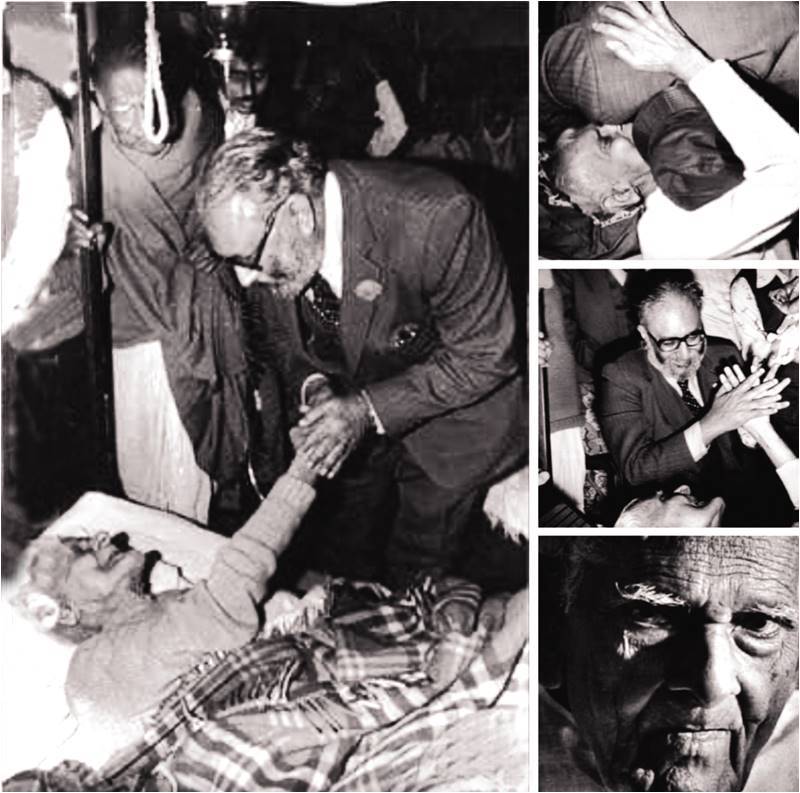
Dr Abdus Salam visited India in December 1979, soon after attending the Nobel award ceremony in Sweden. He requested then Indian prime minister Mrs Indira Gandhi to help him trace his teacher Anilendra Ganguly who had migrated after Partition from Lahore. His mathematics teacher Professor Ganguly had taught Salam mathematics at Sanatan Dharma College, Lahore.
Salam visited Calcutta to pay his respects to octogenarian ailing professor Anilendra Ganguly at latter’s residence on January 19, 1981. He always remained conscious that his love for mathematics was inculcated by Professor Ganguly at Sanatan Dharma College.
Salam shared his 1979 Nobel Prize in Physics with Sheldon Glashow and Steven Weinberg for his contribution to the electroweak unification theory. He was the first Pakistani to receive a Nobel Prize in science and the second from an Islamic country to receive any Nobel Prize.
Salam was science advisor to the Ministry of Science and Technology in Pakistan from 1960 to 1974, a position from which he was supposed to play a major and influential role in the development of the country’s science infrastructure. Salam contributed to developments in theoretical and particle physics.
He was the founding director of the Space and Upper Atmosphere Research Commission (SUPARCO), and responsible for the establishment of the Theoretical Physics Group (TPG) in the Pakistan Atomic Energy Commission (PAEC).[11] As Science Advisor, Salam played a role in Pakistan’s development of the peaceful use of nuclear energy, and may have contributed as well, via Project-706, to development of the atomic bomb project of Pakistan in 1972; for this, he is viewed as the “scientific father” of this programme.
In 1974, Abdus Salam departed from Pakistan in protest after the Parliament of Pakistan passed unanimously a parliamentary bill declaring members of the Ahmadiyya movement, to which Salam belonged, non-Muslims.
Salam visited Calcutta to pay his respects to octogenarian ailing professor Anilendra Ganguly at latter’s residence on January 19, 1981. He always remained conscious that his love for mathematics was inculcated by Professor Ganguly at Sanatan Dharma College.
Salam shared his 1979 Nobel Prize in Physics with Sheldon Glashow and Steven Weinberg for his contribution to the electroweak unification theory. He was the first Pakistani to receive a Nobel Prize in science and the second from an Islamic country to receive any Nobel Prize.
Salam was science advisor to the Ministry of Science and Technology in Pakistan from 1960 to 1974, a position from which he was supposed to play a major and influential role in the development of the country’s science infrastructure. Salam contributed to developments in theoretical and particle physics.
He was the founding director of the Space and Upper Atmosphere Research Commission (SUPARCO), and responsible for the establishment of the Theoretical Physics Group (TPG) in the Pakistan Atomic Energy Commission (PAEC).[11] As Science Advisor, Salam played a role in Pakistan’s development of the peaceful use of nuclear energy, and may have contributed as well, via Project-706, to development of the atomic bomb project of Pakistan in 1972; for this, he is viewed as the “scientific father” of this programme.
In 1974, Abdus Salam departed from Pakistan in protest after the Parliament of Pakistan passed unanimously a parliamentary bill declaring members of the Ahmadiyya movement, to which Salam belonged, non-Muslims.

